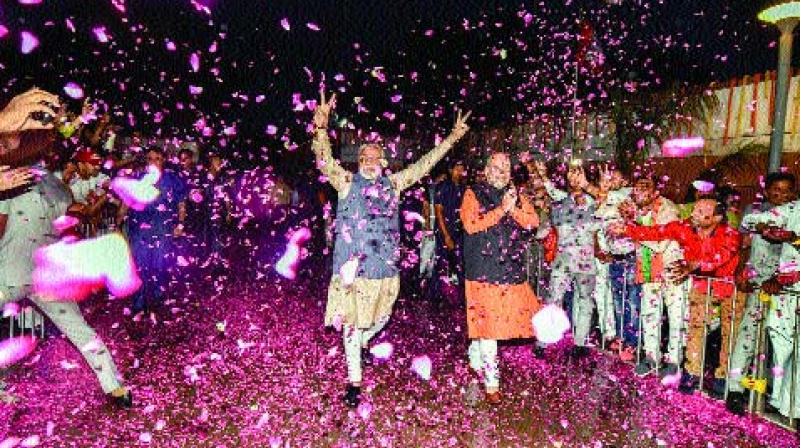After huge 2nd mandate, Modi mantra should be ‘raj dharma’

Long before the announcement of the results of the 2019 parliamentary election, the most fiercely fought one since 1952, veterans as well as NextGen politicians, writers, academics, media wonks and public figures from different fields had been publicly proclaiming the imminent end of the Narendra Modi Sarkar.
Now that the results of a virtual national referendum are out and the BJP has romped home, it’s apparent that these doomsday forecasts were somewhat premature. The forecasters were possibly swayed by their own misperceptions than go-by-ground realities. The tendency of leaders to buy the sycophantic narratives of their cheerleaders and sidekicks also leads to surprising outcomes.
The who’s who of the top Opposition had already written off Mr Modi. “After the results, the country will get a new PM,” said Samajwadi Party president Akhilesh Yadav. “Expiry Babu, you are not my PM!” said Trinamul Congress supremo Mamata Banerjee. “Modi's government is losing, even the RSS has stopped supporting them,” said Mayawati, the BSP chief. “Our data shows Narendra Modi and the BJP are not coming back,” said Congress president Rahul Gandhi in an interview. “This government is in some measure of trouble. There is no Modi wave... I'm not proposing a conspiracy theory, but the slide is going to get worse,” said N. Ram, chairman of The Hindu group of publications. “The BJP may become the biggest party... but Prime Minister Narendra Modi will not hold the post again,” said Nationalist Congress Party chief Sharad Pawar.
How did all of them get it wrong? Were the lack of jobs, farmers' distress, demonetisation and the glitches in the implementation of GST mere figments of the Opposition's imagination?
It's now apparent that the disenchantment with the Modi government on these issues was exaggerated. Millions were hit hard, but their disenchantment didn’t lead to bitterness, as in 1977, when the Opposition parties joined hands with the single aim of “Indira Hatao” following the Emergency under the Indira Gandhi government. Some leaders in 2019 did raise the slogan “Modi hatao” but it did not resonate. Mr Modi skilfully deflected it with: “They say, Modi hatao. I say, desh bachao!”
Trust emerges as the bottomline. Despite the low delivery on so many promises, people were willing to repose their trust in Mr Modi. So they gave him another chance than bank on the opportunistic Opposition alliances.
As shown by tennis greats like Roger Federer, Rafael Nadal, et al, self-belief is an asset; it helps you get the better of your adversary. But underestimating your adversary and overestimating your own capabilities leads to self-deception, resulting in defeat. Mr Gandhi and the other detractors of Mr Modi underestimated his oratorical, organisational and communications skills — including the ability to conjure up aspirational dreams that give him the key to the Indian psyche. They also grossly overestimated their own strengths. Dismissing their inherent contradictions, they went about their campaign. The large majority of voters obviously did not buy it.
It cannot be denied that Mr Gandhi has still emerged as an energetic and articulate leader. He can be a formidable opponent in the future; but needs to get rid of his chamchas and connect with the people. His sister Priyanka, a dignified and suave campaigner, can help revive the Congress. The party’s losses in Madhya Pradesh, Uttar Pradesh, Rajasthan, Karnataka and Bihar must trigger an honest soul search. Rejecting alliances with the AAP, SP, BSP and Trinamul Congress might have gifted more than a dozen seats to the BJP.
Mayawati and Akhilesh Yadav, meanwhile, showed political maturity in stitching an alliance; but, sadly, the bonhomie of the leaders wasn't shared by workers on the ground. Ms Banerjee should have expected such a jolt; she is a mass leader but she could not afford to be a law unto herself! Corruption scandals and goondaism have sullied her image.
Does Mr Modi’s victory mean that all the talk about rising divisiveness, intolerance of contrarian views, strident majoritarianism, vigilantism, control of national institutions, the dominacne of Hindutva was fake news? Or does it reflect the mood of India today?
Mr Modi is an exceptional politician; in 2014 he came to power riding the hopes of millions. He has introduced more people-friendly schemes than all PMs since Independence. If even 60 per cent of these are implemented in full, India will be transformed beyond recognition. Voters have given him a second chance; he must finish the unfinished business of nation-building.
He should not brush aside contrarian views either. Indeed, for a diverse country such as India, the ideals of “vasudhaiva kutumbkam” and “sabka saath sabka vikas” are the raj dharma of any ruler.

